By DASHNOR KALOÇI
Part One
Memorie.al / The events in Kosovo in the spring of 1981, which began in early March with the protests and demonstrations of the student youth and later the people of Kosovo, who rose up to demand their legitimate freedoms and rights, just like all the other peoples and ethnic groups residing at the time in the Socialist Federal Republic of Yugoslavia, had, as is now known, a harsh reaction from official Belgrade. The high leadership of Serbia, on which the Socialist Autonomous Province of Kosovo depended at that time, sent tanks there and suppressed those student protests, not only with police forces, but also by deploying the army and tanks in the streets and squares of Prishtina and other cities where those peaceful protests took place, where during those days (March 11 – April 11, 1981), there were a total of 12 victims.
These events, which became front-page news in all world media, also elicited a strong reaction from official Tirana, where the leader of Communist Albania himself, Enver Hoxha, became maximally engaged in defense of the Kosovo issue and the fundamental rights and freedoms of the Kosovars, who were living on their ancestral lands within the territory of the Federal Republic of Yugoslavia.
The above-mentioned events, and how they unfolded and what their outcome was, are already very well-known, but the one thing that still remains a great enigma is: did official Tirana know what was happening in Kosovo (since those protest demonstrations did not erupt in a single day, without some prior organization) and why did it not raise its voice before they occurred?
If we take a retrospective view and return to the period before the start of those protests, focusing on the last three or four months (November 1980 – February 1981), we will see that; the relations between official Tirana and Belgrade were not only not strained at all, but they had a major upswing towards normality.
This originated back in 1968, when, following the military aggression of the Soviet Union against Czechoslovakia, Josip Broz Tito publicly declared that; in the event of an invasion of Warsaw Pact troops led by the Soviets to occupy Albania, Yugoslavia would close its borders and would not allow such a thing.
This declaration by Marshal Tito seems to have calmed the “bloods” with official Tirana, and from that time until March 1981, there was a very friendly climate and cooperation between Albania and Yugoslavia in several fields, where, besides economic relations and the exchange of goods through import-exports, those of art, culture, sports, etc., also significantly increased.
In this context, there were many exchanges of delegations, artistic groups, sports teams, professors from Tirana giving lectures at the universities of Prishtina, as well as visitors and tourists traveling between the two countries, something that had not happened since the end of 1948, when Enver Hoxha broke off relations with Tito’s Yugoslavia, siding with Stalin and official Moscow.
As we emphasized earlier, these friendly relations and official ties between Tirana and Tito’s Yugoslavia continued quite calmly and without any problem until March 1981; moreover, in the first days of March 1981, the feature film, “Kur pranvera vonohet” (When Spring is Late) (a production of “Kosova-Film”), was being shown in the cinemas of Tirana and the city of Durrës, etc., which was based on the diary motifs of Fadil Hoxha, one of the main political leaders of Kosovo since 1943.
Fadil Hoxha, according to State Security documents sent to Enver Hoxha (which we will examine in this article), had stood by Josip Broz Tito’s bedside when he died in the Ljubljana hospital in Slovenia, about a year earlier (May 1980). Thus, based on this panorama of the events of that time, at first glance it seems that official Tirana and the principal leader of the Party of Labor of Albania (PPSH) himself, Enver Hoxha, had no information about what was “brewing” in Kosovo, because otherwise they would have raised their voice (as they did and acted afterwards), or he would have written in his political diary, just as he wrote, took notes, and made analyses for every conflict happening anywhere in the world, such as in the Middle East, etc., about which he even wrote books!
But it seems this was not the case, as official Tirana and Enver Hoxha not only had knowledge of what was “brewing” in Kosovo, but they possessed extremely detailed knowledge and information about what was happening in the Socialist Autonomous Province of Kosovo and throughout Yugoslavia at the time.
The III Directorate of State Security (Sigurimi), which was the Political Intelligence arm and was attached to the premises and structures of the Ministry of Foreign Affairs in Tirana, through its director Perlat Çaushi (a former intelligence agent at the Albanian embassy in Belgrade in the ’70s, disguised as the first secretary of that embassy), informed his superiors and the high leadership of the PPSH about everything that was happening in Kosovo and the Yugoslav Federation.
However, Enver Hoxha did not raise his voice about the Kosovo issue, or more precisely about what was fermenting there (for which he had detailed information), which in a way would have “burned Belgrade’s cards in its hands,” because Enver was not interested in Kosovo being declared a republic, even within the Yugoslav Federation, because in a way there would be two Albanian states in the Balkans, and Kosovo would take the main attention and role in the international arena, completely eclipsing Enver Hoxha’s Albania!
Without delving into the analyses regarding this, everything boils down to one point: how much did Enver Hoxha love Kosovo and the Kosovars? In connection with this, the fact is well-known that; from the late ’50s until the collapse of the communist regime in the early ’90s, hundreds upon hundreds of Kosovars, forced by Belgrade’s oppressive and discriminatory policy against the people of Kosovo, abandoned their lands and came to Albania, where most of them ended up in the internment camps and prisons of the communist regime of Enver Hoxha and his successor, Ramiz Alia, being accused as UDB agents.
The above remains a subject of analysis for researchers and historians, while in this article we are publishing several secret archival documents extracted from the Archive of the Ministry of Internal Affairs (now declassified and part of the fund of the Authority for Information on Former State Security Files), which are being published for the first time with corresponding facsimiles by Memorie.al.
REPORT – INFORMATION OF THE DIRECTOR OF THE POLITICAL INTELLIGENCE DIRECTORATE, PERLAT ÇAUSHI, REGARDING THE POLITICAL AND SOCIAL SITUATION IN KOSOVO AND YUGOSLAVIA IN THE YEARS 1980-1981
PEOPLE’S SOCIALIST REPUBLIC OF ALBANIA SECRET
MINISTRY OF INTERNAL AFFAIRS Copy No. 1
THIRD DIRECTORATE Tirana, 10.X.1982
INFORMATION
From October 3, 1980, until November 18, 1981, the III Sector of the III Directorate issued 28 pieces of information regarding the situation, events, and slogans, specific elements in Kosovo and the West, as well as the hostile activity of the Yugoslavs against Albanians in Yugoslavia and outside the SPR of Albania (Socialist People’s Republic of Albania).
All this information, with some exceptions, was passed on to the enemy Feçor Shehu. In this information, initially prepared every 10 days and later changed to 15 days following the order of the enemy Feçor Shehu, there were interesting data, although he never noted for them to be forwarded to the Party leadership, with the exception of those seen by the Deputy Minister.
The information regarding the explosive situation in Kosovo alone was abundant and processed dynamically. From this information, concerning the expected events in Kosovo, we highlight the following as the most important data:
Information No. 1447, dated 3.10.1980;
“In the shops of Prishtina, people shouted ‘we want detergents, we want detergents,’ so much so that the police intervened using batons.
A student said: ‘don’t be surprised when you hear in the streets of Prishtina, we want bread, we want bread’! Various individuals expressed that the current situation will have consequences for Kosovo and Yugoslavia.
This year, 84 strikes took place in Yugoslavia; however, only 24 are admitted in internal materials. The two-day strike of Stari-Tërg near Mitrovica in 1980 is one such case…! The unemployment problem in Kosovo is taking on dark dimensions and colors…!
A chaotic situation and insecurity exist in Yugoslavia and Kosovo. This difficult and grave situation in which the people of Kosovo find themselves will one day be fixed…! In the not-too-distant future, the people of Kosovo will speak their mind, as they always have. They will bring forth their popular leaders.
The broad movement that has begun in Kosovo is gradually being well-channeled and on the right track. We believe in our forces and for the decisive moment, we have full confidence in your support…!
Many internal currents in Yugoslavia, opponents of the current line, follow the development of events and adapt to them awaiting the opportune moment to act. The Yugoslavs will try to keep Kosovo at all costs, even in the future.
The Kosovar leadership is very afraid of the “Stalinist” and “Informbiroist” forces in case of war, who were previously imprisoned, therefore it was stated in the meetings of the LCY (League of Communists of Yugoslavia) that these forces should be imprisoned or eliminated immediately in case of war or attack…!
The situation in Kosovo has worsened greatly, and war is expected to break out from one day to the next…! Our life in Kosovo has become unbearable.”
Information No. 1492, dated 13.10.1980;
“Independence without blood is like a flower without scent. We should not be content with the rights we have gained, because there is a strong possibility that reprisals will be repeated. Albania is still not liberated, as the body is divided in two; half has flourished thanks to Enver Hoxha, the other half groans under the revisionist heel.
Tell your leader a word, to cast an eye towards Kosovo. We only await one word from him, and no storm can stop us and extinguish the fire of the war to fulfill the injustices of the centuries.”
Information No. 1632, dated 3.11.1980
“Kosovo has linked its fate with the Federal Yugoslavia, but its eyes and heart are towards Albania. National unity is inevitable. But this must be left to Kosovo, to its efforts, to its struggle, so that no one can accuse Albania…!
We Albanians must be convinced that foreigners have not loved us and do not love us. The general opinion in Kosovo is that something is brewing there, but in what way it will explode is unknown!
People have started sending anonymous letters to Fadil Hoxha, where they label him a traitor and opportunist, who sold Kosovo to the Serbs, that he doesn’t work for it, and that he stood by Tito’s head when he was in agony…!
A great fear exists among the Serbs that Albania is progressing, so the Kosovars have something to lean on, and this indirectly constitutes a threat to them…! We are suffering and turning into slaves, but when the conditions ripen, we too here in Ferizaj will show whose sons we are.”
Information No. 1071, dated 12.11.1980;
The number of revolutionary groups is increasing daily. Some operate openly, while others operate conspiratorially! Serbia is coming to an end, along with the clique it has in Kosovo…! In the Army, they tell us that; why should we fight the external enemy when we have been fighting the internal enemy (the Albanians).
At the end of September in Prizren, leaflets were thrown with slogans like “Long Live Comrade Enver Hoxha,” “Down with the Titoists,” “We want freedom,” etc…! Recently in Kosovo, the magazine “Lajmëtari i Lirisë” (The Messenger of Freedom) has been distributed, which factually unmasks the activity of the Titoist regime against Albania…!
The ideas of the PPSH and Comrade Enver Hoxha are penetrating Kosovo more and more every day. Kosovar youth have now understood the lessons of the Party and Comrade Enver. That day when we will be liberated will come.”
Information No. 1734, dated 21.11.1980;
“When various artistic groups come from Albania, an electrified situation is created in Kosovo.
Such an atmosphere is created there that if someone were to step out and tell them: ‘Attack the Serbs,’ there is a risk that they would go all the way to Belgrade.
Thus, the patriotic and revolutionary spirit exists in Kosovo, but there is a lack of organization…!
The people consider those recently convicted in Kosovo as their best sons and are indignant at these measures taken by the UDB, which have created great insecurity.
Today in Kosovo, there is a silent resistance manifested in various forms, but with political goals, such as sabotage, chaos, and indiscipline in workplaces and institutions.”/
Information No. 1780, dated 2.12.1980;
“An organization called ‘Ylli i Kuq’ (The Red Star) operates in Kosovo. It is said to have many members and works for the national cause…! The work of Comrade Enver “Hrushovianët” – Memoirs, which is broadcast by Radio-Tirana, is listened to in organized groups in Kosovo…!
A 14-year-old girl, arrested by the UDB, when questioned during the investigation: ‘Why do you love Albania, it is weak, poor, and powerless to help and support you,’ she replied:
‘Even if it is poor, weak, and powerless, it doesn’t matter, it is my mother, and a mother, no matter what she is like, is a mother. No child can fail to love her.’
National consciousness has now grown in all social strata, especially among the youth, who feel it the most and often erupt in various forms…! We have gained some rights now, but we have not gained freedom.”/ Memorie.al
DIRECTOR OF THE III DIRECTORATE
PERLAT ÇAUSHI




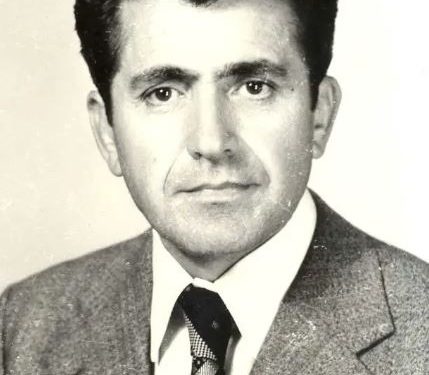
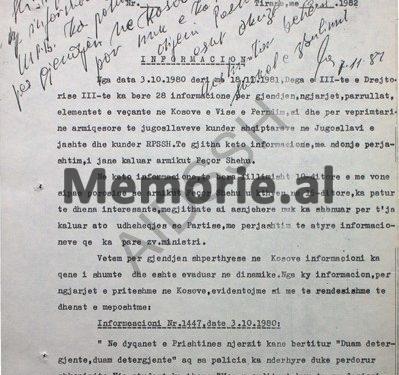
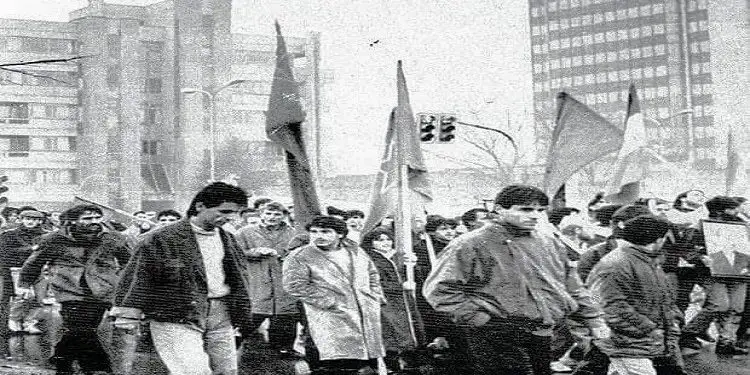
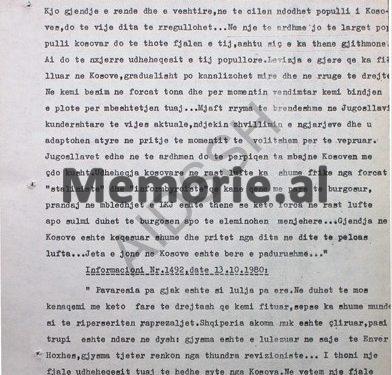
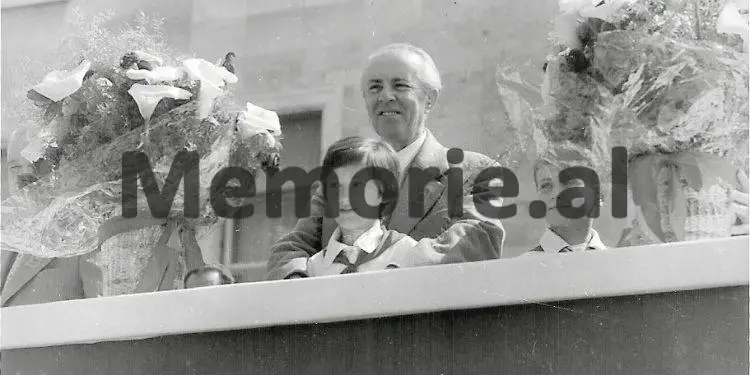
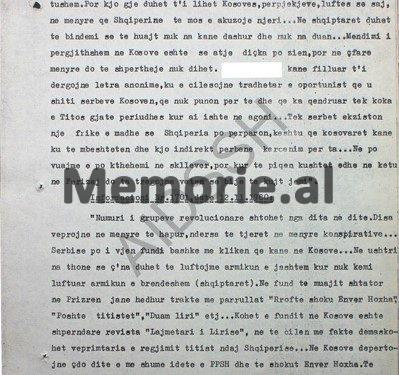
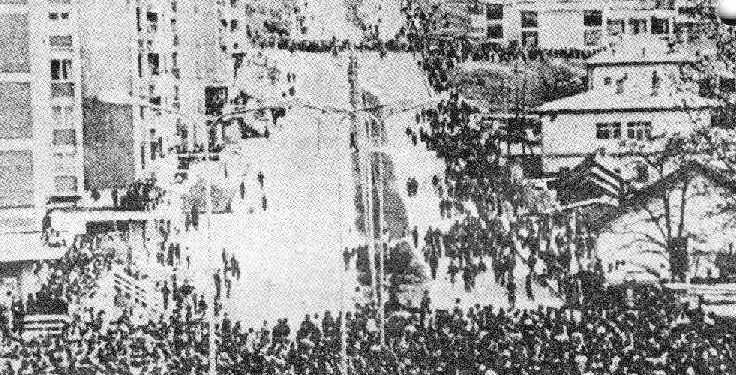
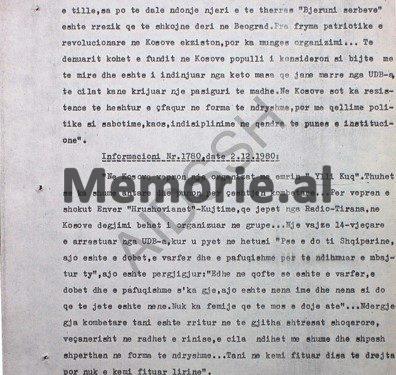
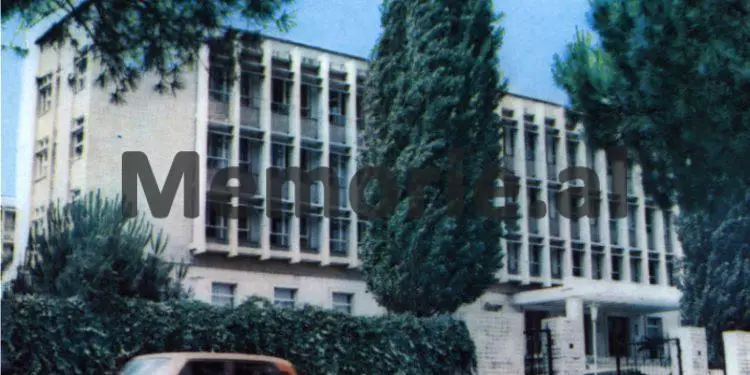
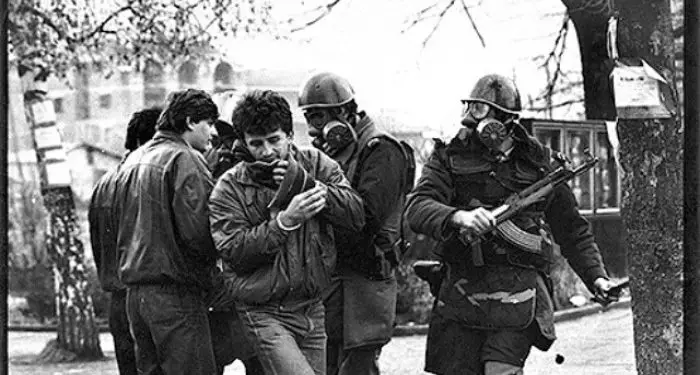



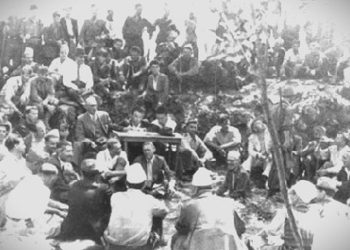
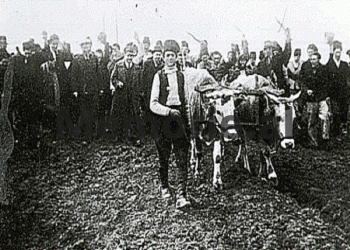
![“They have given her [the permission], but if possible, they should revoke it, as I believe it shouldn’t have been granted. I don’t know what she’s up to now…” / Enver Hoxha’s letter uncovered regarding a martyr’s mother seeking to visit Turkey.](https://memorie.al/wp-content/uploads/2026/01/Dok-1-350x250.jpg)
